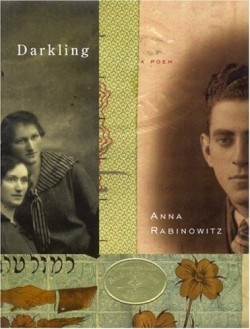Darkling
A Poem
“Bear with me for singing their song / They are not here to sing / They did not want to sing.” So begins the effort—of speaking in different voices, of traversing landscapes and generations, of trying to give words to what others were not able to enunciate. Of writing about death and loss as a poet.
As the title suggests, this is an effort that produces little uplift. Imagination, yes, along with a connectedness to history by way of the “featherings, hatchings, bleeds, filaments, drips and daubs” of so many other writers who are reincarnated, and remixed into a contemporary mélange.
Other Jews-some of them survivors-are important among the influences that the poet mentions. Paul Celan, Elizabeth Herzog, and others were concerned with different aspects of the Holocaust, as Rabinowitz is. It seeps into everything. In a letter about the how old coats are collected, turned inside out, and “made new” as a means of getting through the winter, she writes:
Salvage of coats -
this coat which is Nightmare
this Mantle this Shroud
this Coat which is Map
Of a Coat inflicted on them
Coat of Ruins
Coat of Fear
Nomad Coat
Unable to shield
Darkling is a book-length sequence influenced by the acrostic, which Rabinowitz fell in love with in Thomas Hardy’s The Darkling Thrush. While this form prevails, each page looks different. Some are elliptical and spacious with only the barest words; others are dense as prose poems and have a stream-of-consciousness quality. Rabinowitz might have been in a trancelike state for some of the writing of this collection.
Rabinowitz, who is also the author of At the Site of Inside Out, explains the impulse for this long poem in terms of her preoccupation, over time, with “my inheritance of truncated histories, sketchy memories, bits of narrative, and the contents of a shoebox containing old photos and letters that had been translated for me from Yiddish into English.” The book contains black-and-white facsimiles throughout, which may portray her ancestors. This is not unlike the list of necessary ingredients for other poets who are destined to spend their lifetimes fashioning meanings and constructing images to make sense of the world.
Disclosure: This article is not an endorsement, but a review. The publisher of this book provided free copies of the book to have their book reviewed by a professional reviewer. No fee was paid by the publisher for this review. Foreword Reviews only recommends books that we love. Foreword Magazine, Inc. is disclosing this in accordance with the Federal Trade Commission’s 16 CFR, Part 255.

